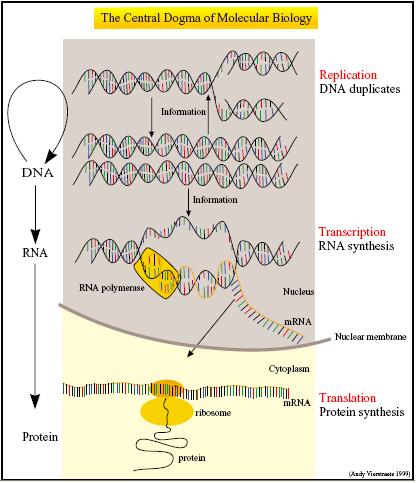Cell-free chassis
Cell-free chassis involve the in vitro expression of genes into proteins. These systems can serve as a compatible chassis for the various parts and devices from the Registry of Standard Biological Parts.
The Central Dogma describes gene expression in terms of two essential processes - the transcription of DNA into messenger RNA (mRNA) and the translation of mRNA into polypeptides 1. Not only do cell-free chassis house the molecular machinery necessary for transcription and translation, they are also optimized for these two processes.
Coupled transcription-translation systems usually combine a bacteriophage RNA polymerase and promoter with eukaryotic or prokaryotic extracts rich in ribosomes, transfer RNAs and aminoacyl-tRNA transferase enzymes. Buffers are also added to maintain the appropriate magnesium and salt concentrations required for efficient translation. In addition, an ATP regenerating system involving either creatine phosphate and creatine kinase or phosphoenolpyruvate and pyruvate kinase is used to power and prolong the lifespan of the expression machinery 2.
A good analogy compared this transcription-translation machinery of the cell-free chassis to the hardware and the synthetic DNA to the software 3. This gives an apt illustration of the ease of building genetically engineered machines using the cell-free approach. Simply by adding the DNA template to the cell extract and feeding solution, the cell-free chassis would be able to express the encoded genetic circuit.
The PURE system has recently been developed as a reconstituted cell-free chassis for synthesizing proteins using recombinant elements 4. This purely synthetic expression system enables even better quality control over the reaction conditions.
| Help: Want to know more about Cell-free chassis? See the help pages for more information. |
References
<biblio>
- 1 pmid=4913914
- 2 pmid=15183761
- 3 pmid=16224117
- 4 pmid=16076456
- 5 pmid=14559971
</biblio>


